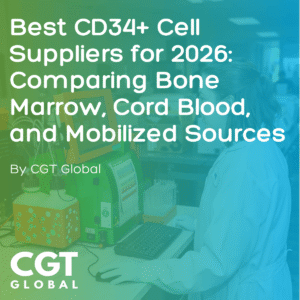What are adult stem cells?
Most cells in the adult body are specialized cell types. Specialized cell types are differentiated cells that serve a specific purpose in a particular tissue. For example, red blood cells are specifically designed to carry oxygen through the blood. Red blood cells perform their function for 100-120 days; new red blood cells are being formed daily to make sure the body gets its supply of oxygen. So where do these new red blood cells come from? In a process called hematopoiesis, stem cells located in your bone marrow and blood give rise to the cells in your blood, red and white blood cells. Stem cells are undifferentiated cells that exist in all tissues of the adult body and are capable of developing into specialized cells, not just blood cells but muscle, nerve, liver, etc. They function to replenish dying cells and maintain the overall health of our body.
How can studying adult stem cells help us?
Stem cells can be used to study the development of a specific cell type. More specifically scientist can learn about the genes that influence a stem cell to differentiate into a specific cell type. Why is this important? Understanding the developmental process of a specific cell type can help scientist identify genetic defects or how certain diseases arise. For example, at some point through a cell’s developmental process it can change and become diseased. What genes were involved in creating these changes? At what point in differentiation did this occur? What if there was a way to fix this gene and prevent the disease? These are just some of the questions scientists are trying to answer.
Stem cells can be used for drug discovery. Scientists are searching for new drugs that improve stem cell function or alter the progress of a disease by identifying potential therapeutic compounds. For example, mesenchymal stem cells (MSCs) found in the bone marrow give rise to connective tissue such as bone, cartilage, and ligaments. What factors promote one specific cell type over the other? Can synthesizing this factor be used in drug therapy? Finding drugs that can promote bone regrowth could aid in alleviating osteoporosis or promote bone healing.
Stem cells can be used in cell replacement therapy. This treatment uses stem cells to generate healthy tissue that replaces damaged tissue caused by disease, aging or injury. For example, during a heart attack the heart sustains damage to not only the muscle tissue but the blood vessels as well. What if stem cells could be used to restore the function of the heart? Scientists have shown that transplanting healthy human stem cells into animal models with damaged hearts regenerates the heart muscle and blood vessels. Breakthroughs like this could potentially replace cardiac bypass surgery, a surgery that is often necessary to restore the blood flow to damaged area of the heart after a heart attack. Within recent years stem cells have been used in studies that target the treatment of Parkinson’s, Alzheimer’s, spinal cord injury, stroke, severe burns, diabetes, arthritis, and leukemia.
What does StemExpress do with the stem cells isolated from your blood or bone marrow?
Isolating stem cells from donated samples of blood or bone marrow can be a time consuming and arduous process. At StemExpress we have developed the technology to isolate these cells quickly and efficiently. Upon request from scientists, isolated stem cells are sent off to their institution where they can begin their research immediately. Cells from StemExpress have been used in a wide variety of research areas, from inherited genetic disease therapies to cancer research.
As the scope of knowledge regarding stem cells expands so to will the potential for treatments of many debilitating diseases. It is donors like you that allow research like this to advance. Donate today and change the lives of tomorrow.








